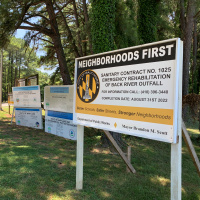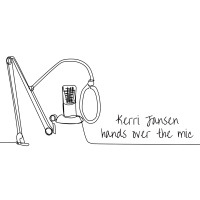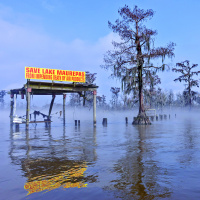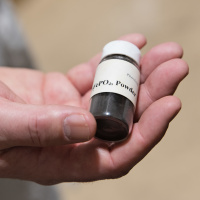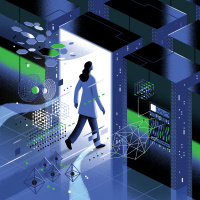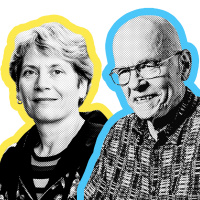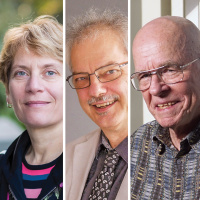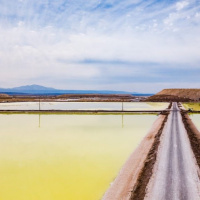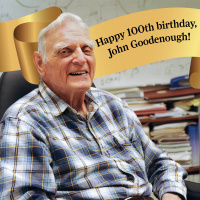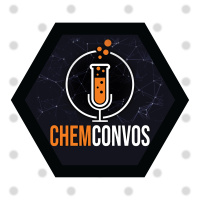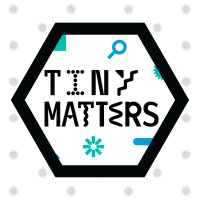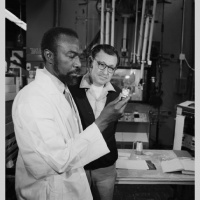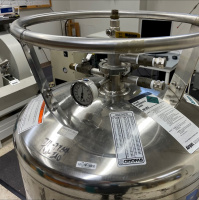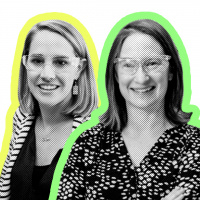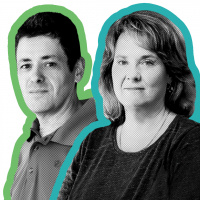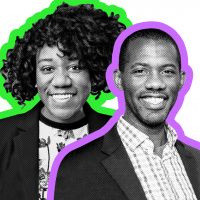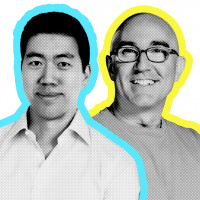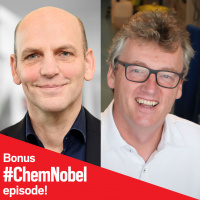Sinopsis
Stereo Chemistry is chemistry news told by the people making it. C&EN is the news magazine of the American Chemical Society.
Episodios
-
Here’s what happens when wastewater treatment facilities fail
06/06/2023 Duración: 26minWhen two wastewater treatment facilities in Baltimore, Maryland, broke down in early 2021, the surrounding waterways began filling up with sewage. In this episode of Stereo Chemistry, C&EN business reporter Craig Bettenhausen takes the pod to visit the Back River Plant and Patapsco Plant in the Chesapeake Bay watershed to demystify how these facilities treat wastewater and take a deep dive into the chemistry behind enhanced nutrient removal systems. Chemical engineers, environmental advocates, and infrastructure experts explore what happens to aquatic ecosystems when wastewater treatment systems fail–and share their perspectives on reimagining wastewater as a chemical treasure trove in the future. Listen to our bonus episode with Kerri Jansen here: cenm.ag/jansen-podcast A transcript of this episode is available at https://cenm.ag/treatment. Credits Producers: Ariana Remmel, Kerri Jansen; Writer: Craig Bettenhausen; Audio editor: Mark Feuer DiTusa; Story editors: Ariana Remmel, Gina Vitale, Chris Gorski,
-
Bonus: Executive producer Kerri Jansen hands over the mic
30/05/2023 Duración: 20minStereo Chemistry’s longtime host Kerri Jansen is stepping down from her role as executive producer of the podcast. Jansen has been with Stereo Chemistry since it began in 2018, and has played an integral role in the production of C&EN’s flagship podcast. In this bonus episode, Jansen talks with C&EN’s interim coeditors for audio & video, Ariana Remmel and Gina Vitale, about some of her favorite episodes from the Stereo Chemistry archives. Subscribe to Stereo Chemistry now on Apple Podcasts, Spotify, or wherever you listen to podcasts. A transcript of this episode is now available at https://cenm.ag/jansen-podcast. Listen to some of Kerri’s favorite Stereo Chemistry episodes: How helium shortages have changed science Lithium mining’s water use sparks bitter conflicts and novel chemistry Nobel laureates Frances Arnold and Jennifer Doudna on prizes, pandemics, and Jimmy Page A world without Rosalind Franklin Why chemists are excited by exascale computing There’s more to James Harris’s story Credits P
-
C&EN Uncovered: The battle for Lake Maurepas
16/05/2023 Duración: 13minCarbon capture and sequestration is the trapping of CO2 emitted by industrial processes and depositing it beneath the Earth’s surface. Spurred on by tax credits offered by recent federal legislation, companies are racing to implement the technology in geologically suitable locations such as in Louisiana.However, the community around Lake Maurepas, Louisiana, has resisted efforts by Air Products to greenlight such a project under the lake. In this episode, C&EN reporters Craig Bettenhausen and Rick Mullin discuss the fears of the community around the implementation of carbon capture and sequestration around Lake Maurepas and the response from Air Products.C&EN Uncovered, a new project from C&EN’s podcast, Stereo Chemistry, offers another look at subjects from recent cover stories. Read Mullin’s April 2nd, 2023, cover story about carbon capture and sequestration around Lake Maurepas at https://bit.ly/3W4lbCE. A transcript of this episode will be available soon at cen.acs.org. Credits Ex
-
C&EN Uncovered: Lithium iron phosphate comes to North America
21/03/2023 Duración: 17minLithium iron phosphate (LFP) batteries are cheaper, safer, and longer lasting than batteries made with nickel- and cobalt-based cathodes. In China, the streets are full of electric vehicles using this technology. But LFP never caught on as a chemistry for electric vehicle batteries in North America. In this episode, C&EN reporters Craig Bettenhausen and Matt Blois talk about the promise and risks of bringing lithium iron phosphate to a North American market.C&EN Uncovered, a new project from C&EN’s podcast, Stereo Chemistry, offers another look at subjects from recent cover stories. Read Blois’s Jan. 30, 2023, cover story about lithium iron phosphate at http://bit.ly/3nbMkpK. A transcript of this episode is available at https://bit.ly/3lzGtKy. CreditsExecutive producer: Kerri JansenC&EN Uncovered host: Craig BettenhausenCover story reporter: Matt Blois Audio editor: Mark Feuer DiTusaStory editor: Michael McCoyCopyeditor: Sabrina AshwellShow logo design: William A. LudwigEpisode artwork
-
Microplastics pollute our drinking water: What are the risks?
21/02/2023 Duración: 27minResearchers reported finding microplastics in drinking water nearly 5 years ago, prompting California lawmakers to require monitoring of the state’s drinking water for the tiny particles. But in 2018, there were no standard methods for analyzing microplastics. So California regulators reached out to chemists and toxicologists from all sectors to develop those methods. They also sought assistance in developing a health-based limit to help consumers understand what the monitoring results mean for their health. In this episode of Stereo Chemistry, we will hear from some of the scientists leading those groundbreaking efforts. A transcript of this episode is available at https://bit.ly/41g6uPa. Credits Executive producer/host: Kerri Jansen Writer: Britt Erickson Audio editor: Mark Feuer DiTusa Story editors: Jyllian Kemsley, Michael McCoy, Ariana Remmel Audience editor: Dorea I. Reeser Copyeditor: Sabrina Ashwell, Heather Holt Logo design: William A. Ludwig Episode artwork: Shutterstoc
-
C&EN Uncovered: What exascale computing could mean for chemistry
31/01/2023 Duración: 17minAt Oak Ridge National Laboratory, a supercomputer named Frontier has broken the exascale computing barrier, meaning it can calculate more than a million trillion floating-point operations per second. In this episode, C&EN reporters Craig Bettenhausen and Ariana Remmel discuss how Frontier works and what that kind of power could mean for computational chemistry.C&EN Uncovered, a new project from C&EN’s podcast, Stereo Chemistry, offers a deeper look at subjects from recent cover stories. Read Remmel’s Sept. 5, 2022, cover story about exascale computing at https://bit.ly/3RkPjr6. A transcript of this episode is available at https://bit.ly/3HNK1S0. Credits Stereo Chemistry executive producer: Kerri Jansen C&EN Uncovered host: Craig Bettenhausen Audio editor: Mark Feuer DiTusa Copyeditor: Sabrina J. Ashwell Additional review: Dorea Reeser, Manny I. Fox Morone, Michael Torrice Episode artwork: Matt Chinworth Music: "Hot Chocolate" by Aves Contact Stereo Chemistry: Tweet at us at @cenmag or email
-
Bonus: Carolyn Bertozzi and Barry Sharpless reflect on winning the 2022 Nobel Prize in Chemistry
06/12/2022 Duración: 12minIn this bonus episode of C&EN’s Bonding Time, we hear from 2022 chemistry Nobel laureates Carolyn Bertozzi and K. Barry Sharpless, who shared the prize along with Morten Meldal for their work on click chemistry and bioorthogonal chemistry. After a November symposium honoring the US-based Nobel awardees at the Embassy of Sweden in Washington, DC, the two chemists discussed their long history of collaboration, how winning the 2022 Nobel Prize in Chemistry has changed their lives, and how they hope to use the spotlight to break down barriers within science. A transcript of this episode is available at bit.ly/3BiU3GZ. To learn even more about this year's Nobel-winning science, listen to our October bonus episode about the prize at bit.ly/3iJ1iSc. Credits Executive producer/host: Kerri Jansen Writer: Gina Vitale Audio editor: Mark Feuer DiTusa Story editor: Michael Torrice Copyeditor: Sabrina Ashwell Logo design: William A. Ludwig Episode artwork: Laura Morton (Bertozzi); Sandy Huffaker (Sharpless)/C&EN Mu
-
BONUS: Click and bioorthogonal chemistry win Nobel Prize in Chemistry
05/10/2022 Duración: 09minThe 2022 Nobel Prize in Chemistry was awarded to Carolyn Bertozzi, Morten Meldal and K. Barry Sharpless for their development of click and bioorthogonal chemistry which are used by chemists around the world to track biological processes and produce pharmaceuticals. In this special episode of Stereo Chemistry, hosts Gina Vitale and Ariana Remmel delve into the science behind the prize and talk with organic chemist Antoni Riera to discuss the applications of the award-winning chemistry. C&EN contributor Mark Peplow also joins the Stereo Chemistry crew to talk about his conversation with Nobel Laureate Carolyn Bertozzi. Read more about this award-winning science in Mark Peplow's article about the 2022 Nobel Prize in Chemistry: https://cen.acs.org/people/nobel-prize/Click-and-biorthogonal-chemistry-win-2022-Nobel-Prize-in-Chemistry/100/web/2022/10 A transcription of this episode is available at https://cenm.ag/nobelpod22. CORRECTION: On Oct. 6, 2022, part of this episode was rerecorded to correct an error
-
Lithium mining’s water use sparks bitter conflicts and novel chemistry
13/09/2022 Duración: 35minReplacing gas cars with electric ones is a main pillar of plans to fight climate change. But the lithium-ion batteries used in electric cars come with a cost. Communities near the Salar de Atacama in Chile, where about a quarter of the world’s lithium is extracted from salty aquifers, say mining companies pose a serious threat to the local environment and their access to water. Mining companies strongly dispute those claims. In this episode of Stereo Chemistry, we’ll explore the environmental factors at play in the salar and the differing perspectives on how best to measure impact. And we’ll hear from a new group of mining start-ups that claim they can use chemical methods—as yet unproven—to extract lithium without the same impact on water. This is the first episode in a new series exploring the future of water. A transcript of this episode, along with English translations of all Spanish dialogue, is available at bit.ly/3QGlQpu. Sign up for C&EN’s email series “Advancing in the Art of Science Communicat
-
Bonus: For John Goodenough’s 100th birthday, we revisit a fan-favorite interview with the renowned scientist
25/07/2022 Duración: 38minFamed lithium-ion-battery pioneer and Nobel Prize–winner John Goodenough has achieved yet another milestone—a century on Earth. Goodenough celebrates his 100th birthday on July 25, 2022. In honor of the occasion, Stereo Chemistry host Kerri Jansen and C&EN reporter Mitch Jacoby revisit their 2019 interview with the renowned scientist, recorded at his office at the University of Texas at Austin just prior to his Nobel win. In the expansive and candid conversation, Goodenough tells Stereo Chemistry about childhood adventures, infernal exams with Enrico Fermi, and his path to the innovation that enabled an electronics revolution. A transcript of this episode is available at bit.ly/3otFrh3. Music credit: “Happy Birthday To You (Orchestral)” by beanstalkaudio/Pond5.com Image credit: Mitch Jacoby/Robert Bryson/C&EN/Milano M/Shutterstock
-
Bonus: Jess Wade on Wikipedia and work-life balance
21/06/2022 Duración: 55minThis month, Stereo Chemistry is sharing an episode of the podcast ChemConvos featuring an interview with materials scientist, self-described “Raman spectroscopy enthusiast,” and prolific Wikipedia editor Jess Wade. On ChemConvos, hosts Henry Powell-Davies and Medina Afandiyeva seek to uncover the story behind the scientist. In this episode, the trio discusses not only Jess’s work as a research fellow at Imperial College London but also how she manages burnout and the importance of a supportive lab culture. And, of course, they dig into the origins of her Wikipedia project, which has resulted in Wade creating more than 1,400 biographies on Wikipedia aiming to highlight women, people of color, and LGBTQ+ scientists and engineers. Follow ChemConvos on Twitter at @ChemConvosPod. Find new episodes at anchor.fm/chemconvospod or on your favorite podcast platform. A transcript of this episode is available at bit.ly/3yb4lb8. Image credit: Courtesy of ChemConvos/C&EN
-
Bonus: The sticky science of why we eat so much sugar
31/05/2022 Duración: 34minOur bodies need sugar to survive. But most of us consume way more than we actually need, and many foods and beverages pack a dose of added sweeteners. So why are we eating all of this extra sugar? This month, Stereo Chemistry is sharing an episode of the podcast Tiny Matters that examines that question. In the episode, hosts Sam Jones and Deboki Chakravarti explore sugar’s impact on our bodies and trace how a genetic mutation that helped our distant ancestors survive is influencing our health today. And they dig into the debate around whether sugar can fairly be called addictive. Note: This episode contains discussion of addiction and eating disorders. Listen to Tiny Matters on the American Chemical Society’s website at https://www.acs.org/content/acs/en/pressroom/tiny-matters.html or on your favorite podcast platform. ACS also publishes Chemical & Engineering News, which is the independent news outlet that powers Stereo Chemistry. More on sugar from C&EN: The sugar wars are about to change your food
-
Bonus: There’s more to James Harris’s story
27/04/2022 Duración: 45minChemists may know James Harris as the first Black scientist to be credited with codiscovering an element. In fact, we referenced this in a previous episode of Stereo Chemistry about making superheavy elements. But beyond this memorable factoid, details about the accomplished nuclear chemist are scarce, and most sources repeat the same superficial information. Kristen Frederick-Frost, curator of modern science at the Smithsonian’s National Museum of American History, wants to change that. After discovering that the museum's database lacked material on Harris, she scoured archival records and sought out former colleagues, friends, and family members to fill in details of his life and career. In this bonus episode of Stereo Chemistry, host Kerri Jansen and special guest Dr. Darryl Boyd join Frederick-Frost to explore James Harris’s story beyond the discoveries that made him famous. And we even get an unexpected peek into his lab, courtesy of the US National Archives. Boyd, a polymer chemist, previously research
-
Bonus: The helium shortage that wasn’t supposed to be
24/03/2022 Duración: 14minHelium shortages can derail research and threaten expensive instruments that depend on the gas to operate safely. In late 2020, analysts predicted—and we reported—that pressures on the global helium market were likely to ease as new production capacity came online. Today, helium users are again facing price spikes and limited supplies, driven by a variety of factors including political instability in Europe and technical malfunctions at key suppliers. In this bonus episode of Stereo Chemistry, C&EN industrial gas reporter Craig Bettenhausen explains how we ended up here again and how the outlook for the global helium market has evolved. A transcript of this episode is available at bit.ly/3tBSGzF. For more background about where helium comes from, why it's so important to science, and what happens when you can't get enough of it, check out our October 2020 podcast episode, How helium shortages have changed science. Image credit: Boris Steinberg, Johns Hopkins Chemistry Music credit: “How Did I Get Her
-
Sarah Reisman and Melanie Sanford on how organic chemistry is changing and how they’ve learned to choose priorities
15/02/2022 Duración: 23minBeing a chemistry professor is a juggling act. But sometimes professors have too many balls in the air. How do they know which ones to grab and which to let drop? In this episode of Stereo Chemistry, C&EN's Leigh Krietsch Boerner sits down with organic chemists Sarah Reisman and Melanie Sanford to hear how they decide what projects to work on, what sparks joy for them in the lab, and what being an organic chemist really means to them. A transcript of this episode will be available soon at cen.acs.org. Sign up for C&EN’s Selling Your Science: The Art of Science Communication at cenm.ag/sciencecommunication. Contact Stereo Chemistry by emailing cenfeedback@acs.org. Image credit: Will Ludwig/C&EN/Lance Hayashida/University of Michigan
-
Jose-Luis Jimenez and Kimberly Prather on the intersection of aerosol science and the COVID-19 pandemic
18/01/2022 Duración: 25minImagine you’re an atmospheric chemist. There’s a pandemic. And public health officials release information about how the virus spreads from one person to another—information that directly contradicts your knowledge of how tiny particles move in the air. What do you do? In this episode of Stereo Chemistry, Jose-Luis Jimenez and Kimberly Prather talk to C&EN editor Jyllian Kemsley about how they’ve handled that situation over the past 2 years. They share their frustrations with public health officials along with the heartbreak and rewards of communicating science with the general public, and what they plan to take from their experiences as they think about their research going forward. A transcript of this episode is available at bit.ly/3rzzCzI. Sign up for C&EN’s Selling Your Science: The Art of Science Communication at cenm.ag/sciencecommunication. Contact Stereo Chemistry: cenfeedback@acs.org Image credit: Will Ludwig/C&EN/Mariana Pereira (Jimenez)/Erik Jepsen/University of California San Diego
-
Jessica Ray and William Tarpeh on clean water, turning trash into treasure, and life as assistant professors
21/12/2021 Duración: 27minHow do we build water systems that are sustainable and also equitable? On this episode of Stereo Chemistry, Jessica Ray and William Tarpeh talk with C&EN reporter Katherine Bourzac about how they use their chemical engineering know-how to develop simple systems for filtering toxic chemicals from our water and harvesting useful chemicals from urine. They also discuss finding ways to thrive as assistant professors and building support networks as Black junior faculty. A transcript of this episode is available at https://bit.ly/3pggyGU. Sign up for C&EN’s weekly newsletter at bit.ly/chemnewsletter. Contact us: cenfeedback@acs.org Image credit: Will Ludwig/C&EN/University of Washington/Courtesy of William Tarpeh
-
David Liu and Stuart Schreiber on the science that motivates, fascinates, and tells us who we are
23/11/2021 Duración: 33minWhat motivates a creative scientific mind? How does an accomplished scientist pinpoint new subjects to explore? How is the field of chemical biology evolving? In this episode of Stereo Chemistry, we probe those questions with scientists and serial entrepreneurs David Liu and Stuart Schreiber, both pioneers in developing tools that use chemistry to explore biology. A transcript of this episode and links to past C&EN coverage of David Liu and Stuart Schreiber will be available soon at cen.acs.org. Read Stuart Schreiber’s Harvard Magazine article about discovering his family’s secrets at https://www.harvardmagazine.com/2019/07/dna-testing-schreiber Sign up for C&EN’s weekly newsletter at bit.ly/chemnewsletter. Image credit: Will Ludwig/C&EN/Beam Therapeutics/Stuart Schreiber
-
Preview: New season coming on Nov. 23
26/10/2021 Duración: 05minStereo Chemistry’s new season will launch on Nov. 23, featuring eight chemistry greats in conversation with . . . each other. In each episode, two sensational chemists will pair up for in-depth conversations moderated by a C&EN reporter. Listen now as show host Kerri Jansen reveals the lineup with new Stereo Chemistry team member Attabey Rodríguez Benítez. Image credit: C&EN/Shutterstock Want to contact Stereo Chemistry? Email cenfeedback@acs.org
-
BONUS: Molecule-building tool wins Nobel Prize in Chemistry
06/10/2021 Duración: 07minThe 2021 Nobel Prize in Chemistry went to Benjamin List and David W. C. MacMillan for their development of asymmetric organocatalysis, which has proved to be a powerful tool for building molecules. In this special episode of Stereo Chemistry, host Kerri Jansen, C&EN reporter Leigh Krietsch Boerner, and C&EN editorial fellow Emily Harwitz delve into the science behind the prize. Merck’s Rebecca Ruck also joins the Stereo Chemistry crew to weigh in on how organocatalysis has impacted drug development. An edited transcript of this episode is available at bit.ly/2WOGCNR. Read more about the 2021 Nobel Prize in Chemistry in Leigh Krietsch Boerner’s article on the prize at bit.ly/3iD0hs2. Image credit: © Frank Vinken (List); Princeton University, Department of Chemistry, © Todd Reichart (MacMillan)

